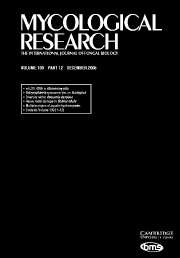Crossref Citations
This article has been cited by the following publications. This list is generated based on data provided by
Crossref.
Bearchell, Sarah J.
Fraaije, Bart A.
Shaw, Michael W.
and
Fitt, Bruce D. L.
2005.
Wheat archive links long-term fungal pathogen population dynamics to air pollution.
Proceedings of the National Academy of Sciences,
Vol. 102,
Issue. 15,
p.
5438.
Bernicchia, Annarosa
Fugazzola, Maria A.
Gemelli, Vittorio
Mantovani, Barbara
Lucchetti, Andrea
Cesari, Michele
and
Speroni, Ester
2006.
DNA recovered and sequenced from an almost 7000 y-old Neolithic polypore, Daedaleopsis tricolor.
Mycological Research,
Vol. 110,
Issue. 1,
p.
14.
Heitman, Joseph
2006.
Sexual Reproduction and the Evolution of Microbial Pathogens.
Current Biology,
Vol. 16,
Issue. 17,
p.
R711.
Thines, M.
Zipper, R.
Schäuffele, D.
and
Spring, O.
2006.
Characteristics of Pustula tragopogonis (syn. Albugo tragopogonis) Newly Occurring on Cultivated Sunflower in Germany.
Journal of Phytopathology,
Vol. 154,
Issue. 2,
p.
88.
Cohn, Marita
Liti, Gianni
and
Barton, David BH
2006.
Comparative Genomics.
Vol. 15,
Issue. ,
p.
101.
Lehtinen, A.
Hannukkala, A.
Rantanen, T.
and
Jauhiainen, L.
2007.
Phenotypic and genetic variation in Finnish potato‐late blight populations, 1997–2000.
Plant Pathology,
Vol. 56,
Issue. 3,
p.
480.
Gómez-Alpizar, Luis
Carbone, Ignazio
and
Ristaino, Jean Beagle
2007.
An Andean origin of
Phytophthora infestans
inferred from mitochondrial and nuclear gene genealogies
.
Proceedings of the National Academy of Sciences,
Vol. 104,
Issue. 9,
p.
3306.
Gómez-Alpizar, Luis
Hu, Chia-Hui
Oliva, Ricardo
Forbes, Gregory
and
Ristaino, Jean Beagle
2008.
Phylogenetic relationships ofPhytophthora andina, a new species from the highlands of Ecuador that is closely related to the Irish potato famine pathogenPhytophthora infestans.
Mycologia,
Vol. 100,
Issue. 4,
p.
590.
Telle, Sabine
Thines, Marco
and
DeSalle, Robert
2008.
Amplification of cox2 (~620 bp) from 2 mg of Up to 129 Years Old Herbarium Specimens, Comparing 19 Extraction Methods and 15 Polymerases.
PLoS ONE,
Vol. 3,
Issue. 10,
p.
e3584.
Thines, Marco
Göker, Markus
Telle, Sabine
Ryley, Malcolm
Mathur, Kusum
Narayana, Yaladabagi D.
Spring, Otmar
and
Thakur, Ram P.
2008.
Phylogenetic relationships of graminicolous downy mildews based on cox2 sequence data.
Mycological Research,
Vol. 112,
Issue. 3,
p.
345.
2008.
Molecular Biology in Plant Pathogenesis and Disease Management.
p.
197.
Narayanasamy, P.
2008.
Molecular Biology in Plant Pathogenesis and Disease Management.
p.
7.
Fry, William E.
Gr¨︁nwald, Niklaus J.
Cooke, David E. L.
McLeod, Adele
Forbes, Gregory A.
and
Cao, Keqiang
2009.
Oomycete Genetics and Genomics.
p.
139.
Rossman, Amy Y.
2009.
The impact of invasive fungi on agricultural ecosystems in the United States.
Biological Invasions,
Vol. 11,
Issue. 1,
p.
97.
GOSS, E. M.
CARBONE, I.
and
GRÜNWALD, N. J.
2009.
Ancient isolation and independent evolution of the three clonal lineages of the exotic sudden oak death pathogen Phytophthora ramorum.
Molecular Ecology,
Vol. 18,
Issue. 6,
p.
1161.
Lehtinen, A.
Andersson, B.
Le, V. H.
Nærstad, R.
Rastas, M.
Ketoja, E.
Hannukkala, A. O.
Hermansen, A.
Nielsen, B. J.
Hansen, J. G.
and
Yuen, J.
2009.
Aggressiveness of Phytophthora infestans on detached potato leaflets in four Nordic countries.
Plant Pathology,
Vol. 58,
Issue. 4,
p.
690.
Rossman, Amy Y.
2009.
Ecological Impacts of Non-Native Invertebrates and Fungi on Terrestrial Ecosystems.
p.
97.
Ploch, Sebastian
Choi, Young-Joon
Rost, Christoph
Shin, Hyeon-Dong
Schilling, Edward
and
Thines, Marco
2010.
Evolution of diversity in Albugo is driven by high host specificity and multiple speciation events on closely related Brassicaceae.
Molecular Phylogenetics and Evolution,
Vol. 57,
Issue. 2,
p.
812.
Guo, Liyun
Zhu, Xiao-Qiong
Hu, Chia-Hui
and
Ristaino, Jean Beagle
2010.
Genetic Structure of Phytophthora infestans Populations in China Indicates Multiple Migration Events.
Phytopathology®,
Vol. 100,
Issue. 10,
p.
997.
Spring, Otmar
and
Thines, Marco
2010.
Molecular Identification of Fungi.
p.
35.




